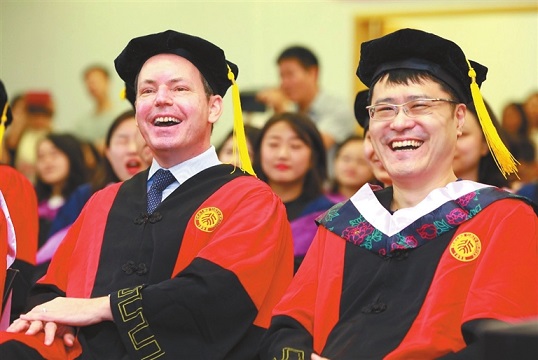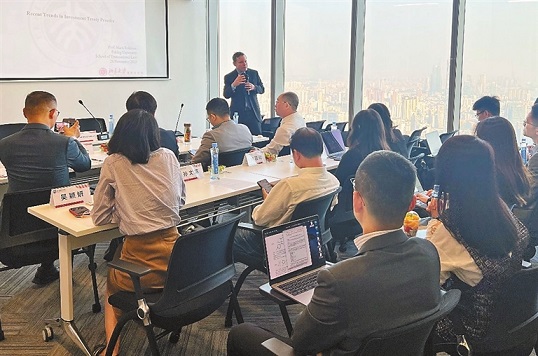Shenzhen
 2024/2/22
2024/2/22
 source: Shenzhen Daily
source: Shenzhen Daily
 Print
Print

Prof. Mark Feldman (L) and one of his colleagues at an event celebrating STL’s 15th anniversary last year. Photos courtesy of STL

Prof. Mark Feldman gives a lecture during the International Investment and Arbitration Seminar held in Guangzhou in November 2023.
Yang Mei
595383341@qq.com
ASSEMBLING global talent and making the best use of them is key to the internationalization of Shenzhen’s legal environment, Prof. Mark Feldman, interim dean of the Peking University School of Transnational Law (STL), said during an interview with Shenzhen Daily.
The legal scholar and seasoned arbitrator stressed that the next step is appointments of those international participants to actual cases.
STL celebrated its 15th anniversary last October. In the school’s 15-year history, Feldman, who joined STL in 2011, has spent 12 years as a professor of law. His research areas include multinational enterprises, international investment and dispute resolution, and China as a rule-maker and institution builder.
“We are a Chinese law school with a strong international presence. We have our resident faculty include nationals from South Korea, the U.K., Greece, and the U.S.,” Prof. Feldman said. “And we thrive in this environment. We really are all drawn to this idea of people from different cultures with different social norms and different ways of communicating.”
Advancing SCIA’s
internationalization
Before his tenure at STL, Prof. Feldman worked at the U.S. Department of State for five years and led a team that represented the U.S. in investment treaty arbitration and provided legal counsel supporting the negotiation of U.S. bilateral investment treaties (BIT) and investment chapters of free trade agreements (including TPP and U.S.-China BIT negotiations).
Prof. Feldman also serves as an arbitrator with the Shenzhen Court of International Arbitration (SCIA), a position he has held for more than a decade. SCIA was established in 1983 as the first arbitration institution in the Guangdong-Hong Kong-Macao region after China’s reform and opening up.
SCIA provides arbitration and mediation services for up to 140 countries and regions worldwide, and its panel of arbitrators covers 114 countries and regions.
Its mission is to help Chinese and foreign parties to solve commercial disputes and constructing a just, fair, harmonious, and orderly business environment.
Regarding investment treaty arbitration, Prof. Feldman supported SCIA’s development of expertise in the area by sharing his five-year experience representing the U.S. Government in international investment disputes and collaborating with the SCIA on the development of a roster of arbitrators specializing in international investment disputes in 2016.
In 2018, Prof. Feldman served as moderator for an event hosted by the SCIA in New York. In the same year, the International Chamber of Commerce (ICC) and the SCIA held a major event in Shenzhen on the enforcement of arbitral awards under a treaty known as the New York Convention.
He said it’s essential for the SCIA to have a global presence in order to participate in the international arbitration community.
“The international arbitration community is a global community. I think the SCIA has really illustrated how they have reached out to many international institutions,” he pointed out.
He acknowledges the role of the Belt and Road Initiative (BRI) with respect to dispute resolution and prevention. “With respect to dispute resolution and prevention, the BRI creates a lot of opportunities,” he said. “There’s so much attention on the BRI and the development of dispute resolution, mechanisms, and platforms that are tied to the BRI. It’s a new landscape. For scholars, it gives us opportunities to think creatively about what future dispute resolution in the region might look like.”
Looking forward
to more exchanges
Prof. Feldman said that he was glad to see that China and the U.S. have agreed to increase international travel and direct flights, as well as commit to greater student exchanges during Chinese President Xi Jinping and U.S. President Joe Biden’s meeting last November in San Francisco. “It’s so important to have a lot of direct flights between the two jurisdictions and opportunities for face-to-face engagement. Because when you spend time together in person, it becomes so obvious that maybe we can make some progress,” he said.
The professor hoped he could be of more help in bringing more faculty and students from top U.S. law schools to Shenzhen.
He said he likes Shenzhen as much as he likes New York because the two cities’ urban environment and inclusiveness. “I like urban environments where there’s a lot of life on the street and you can become a part of that life,” he said.
He mentioned he likes Shenzhen’s welcoming spirit as implied in a famous saying “来了就是深圳人”(literally meaning “When you’re in Shenzhen, you’re a Shenzhener”). “I would translate it into ‘When you arrive in Shenzhen, you are already a Shenzhener.’ And that’s how I felt about New York when I arrived in 1996 for Columbia Law School. I immediately felt like this is home, this is my place,” he recalled.
The professor said that he expects more young American students to come and visit Shenzhen, know more about the city, and fall in love with it.





